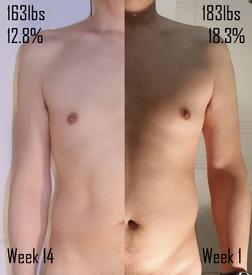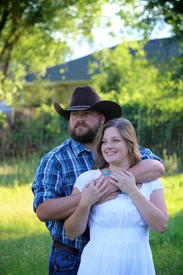Strength training and where your heart rate is.

snowy0wl
Posts: 179 Member
Is there a general rule that when you are lifting that you should have an elevated heart rate? I thought I couldn't really lift weights and my heart rate doesn't go that high maybe 110-120.. should it be a lot higher if my resting heart rate is 70-80?
0
Replies
-
I do not pay any attention to my heart rate when doing any exercise. Just do your routine and don't fret over it.0
-
I don't pay attention to my heart rate when lifting weights. I do notice when I super set my heart rate goes up more than if I'm doing just one movement at a time. I do one exercise with no rest between four movements. Open squat rack- 12 reps front squats 12 reps military press 12 reps lunges each leg then 12 reps lifting barbell from waist to chin. all is one set and its pretty intense even with just 105 lbs. My heart rate jumps above 120. I normally do this twice to end my workout..0
-
I don't know what the rule is but my heart rates spikes very high when I lift, even heavy singles but drops to low 50s resting.0
-
thank you. I'm not sure if I'm really lifting heavy enough. My priority is to keep good form which includes proper contraction and not use momentum to cheat.0
-
Power cleans get my heart rate to around 140-150, so do heavy deads.
Rigger0 -
Michael190lbs wrote: »I don't pay attention to my heart rate when lifting weights. I do notice when I super set my heart rate goes up more than if I'm doing just one movement at a time. I do one exercise with no rest between four movements. Open squat rack- 12 reps front squats 12 reps military press 12 reps lunges each leg then 12 reps lifting barbell from waist to chin. all is one set and its pretty intense even with just 105 lbs. My heart rate jumps above 120. I normally do this twice to end my workout..
interesting way to feel the pump at the end of the workout. Not really surprised though.0 -
Generally, you’ll see a rise in heart rate for any activity you perform. The longer and faster you move, the more your heart rate will go up. But that is not really a measure of the intensity of the weight lifting as much as just movement. If you do squats with 100 lbs you probably won’t see much difference from doing 80 lbs. If you were talking about blood pressure, then you might be on to something.0
-
I don't worry about my HR when I'm lifting...that isn't the purpose of lifting.0
-
cwolfman13: this may be unrelated but how do you know when you are lifting 'hard' enough? I'm just beginning and never paid much attention to HR, but when I tried a really heavier weight then my HR shot up. Wouldn't that be better indicator that you are actually really working hard? I guess its simular to if you work out isn't i normal to get all sweaty?0
-
cwolfman13: this may be unrelated but how do you know when you are lifting 'hard' enough? I'm just beginning and never paid much attention to HR, but when I tried a really heavier weight then my HR shot up. Wouldn't that be better indicator that you are actually really working hard? I guess its simular to if you work out isn't i normal to get all sweaty?
You can tell intensity level without using a heart rate monitor.0 -
I don't really get your question, you totally lose me when you say 'I thought I couldn't lift weights'
are you afraid of over exertion? do you have a heart condition? are you thinking your not working hard enough?
I'd say one doesn't really have much to do with the other, especially because there are a lot of goals one might try to achieve with resistance training.
I would say that if the goal is increasing strength, and your heart rate is dramatically elevated, then your probably going through your routine too fast to achieve optimal strength results.0 -
yopeeps02: what do you look for?0
-
never really noticed my HR go up from heavier weight alone, but put the sets to close together and it will happen.
actually I guess it does, but it goes down so quickly I don't really think of it as an elevated heart rate.
I think this will play back into how close your sets are0 -
yopeeps02: what do you look for?
For lifting weight: Heavy training is sometimes going til failure with proper form. Everything in lifting weight should be with proper form to prevent injury. Take it from some one who got surgically repair muscle from improper form, it's not fun as much as I like to wear it as a badge of my lifting career dedication.
So when you went to pick do heavy weight for x amount of reps? If you went to failure you would have be in high intensity for you.0 -
cwolfman13: this may be unrelated but how do you know when you are lifting 'hard' enough? I'm just beginning and never paid much attention to HR, but when I tried a really heavier weight then my HR shot up. Wouldn't that be better indicator that you are actually really working hard? I guess its simular to if you work out isn't i normal to get all sweaty?
It really depends on what I'm after...I do some metabolic stuff in the weight room, usually just to get things warmed up...kettle bell swings, dumbbell snatches, etc. But by and large my objective is to push and pull as much weight as possible in my given rep range. Basically know that I'm working hard enough when I'm pretty close to not being able to get the last rep up in a set. I know what my 1 RM is on various lifts and I know what % of that I should be working depending on my rep range.
To maximize my lifts, rest is required...if I'm in a "heavy" cycle for example, I might do a set of 3 squats...and then rest a good 2-3 minutes to ensure I can get that weight up again on subsequent sets. I pretty much give myself 2 minutes rest between sets on most Oly work. In higher rep ranges I might only rest for a minute or 1:30.
I do some bootcamp/circuit kind of stuff for about a month a couple of times per year for which I don't give myself much rest and I work low weight high rep for endurance...I do try to keep my HR elevated most of that time...but I've been training now for just shy of 3 years so I have a pretty good feel for my level of effort and intensity without needing a HRM. I have one from when I started, but the battery died some time ago and I've never replaced it.
0 -
Are you following a weightlifting program? If you are not, find one to follow and follow it. It will tell you how to figure out how much to lift and how to progress.0
-
I used to do squat sets of 100 reps at 135#. My heart would be racing by the time I finished, believe you me! lol (My 1RM is 475, so it wasn't the weight itself.)0
-
-
This content has been removed.
-
I use my heart rate as an indicator of recovery between sets.0
-
-
Interesting question. I actually did notice my HR going up after my sets as I progressed in weight. When I started squatting (3 sets of 5 reps), finishing a set felt like I just ran up a flight of stairs. Now, as I’ve added more weight, I feel like I just ran up 8+ flights. I don’t know if this means much to you, but my heart is basically beating out of my chest. I too progressed slowly because I always put form first. Also, I’m eating at a deficit, so this could always just mean I’m getting tired.
A lower HR doesn’t necessarily mean you’re not lifting enough, though, I don’t think. Your rate of progress is only based on whether you can finish your reps at the current weight, as I understand it. I personally would follow the lifting program’s progression instructions over anything else (I do Starting Strength).0 -
cwolfman13: this may be unrelated but how do you know when you are lifting 'hard' enough? I'm just beginning and never paid much attention to HR, but when I tried a really heavier weight then my HR shot up. Wouldn't that be better indicator that you are actually really working hard? I guess its simular to if you work out isn't i normal to get all sweaty?
The basic answer is, you know. Lifting weights is a very taxing activity. You’re struggling to keep good form for a set number of reps. The muscles are engaging more and more fibers as you go. And then you’re done. You can’t do another rep with good form.
0 -
I'm just beginning my strength training and I can immediately tell my left is a lot weaker than my right and simple exercises are activating the wrong intended muscles. I'm not sure if there is any other way to improve it other than keep to a low weight and focus on form till it gets better.0
-
Low weight and form are good, but if you feel one side is weaker than the other, try using dumbbells instead of barbells, along with split squats for legs, to catch up. This has the added benefit of working the core muscles harder at the same time to keep straight and stabilized. So if you do a set of curls, start with your weaker arm. However many reps you get with that arm, use the same weight for the same reps on your other arm, even though you'll feel you can do more. Don't worry about losing strength in your strong arm, because it won't take long for your weaker arm to catch up.0
This discussion has been closed.
Categories
- All Categories
- 1.4M Health, Wellness and Goals
- 398.1K Introduce Yourself
- 44.7K Getting Started
- 261K Health and Weight Loss
- 176.4K Food and Nutrition
- 47.7K Recipes
- 233K Fitness and Exercise
- 462 Sleep, Mindfulness and Overall Wellness
- 6.5K Goal: Maintaining Weight
- 8.7K Goal: Gaining Weight and Body Building
- 153.5K Motivation and Support
- 8.4K Challenges
- 1.4K Debate Club
- 96.5K Chit-Chat
- 2.6K Fun and Games
- 4.8K MyFitnessPal Information
- 12 News and Announcements
- 21 MyFitnessPal Academy
- 1.5K Feature Suggestions and Ideas
- 3.2K MyFitnessPal Tech Support Questions











